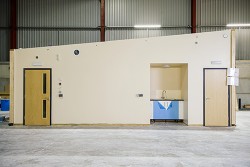With technological advances in clean or renewable energy, construction materials and offsite building methodologies, the net zero benchmark for energy performance in buildings has become achievable. Neil Smith, Chief Executive Officer of Net Zero Buildings (NZB) outlines its energy efficient Schoolhaus design.
Since our formation in 2010 NZB has developed inspiring teaching spaces which utilise offsite construction methods and standardised components to deliver permanent buildings incorporating valuable energy saving efficiencies. Our Schoolhaus buildings are impacting on construction within the education sector by making cost-efficient and sustainable buildings accessible, whilst providing state-of-the-art learning environments for 21st century teaching.
NZB’s processes maximise offsite construction and minimise onsite disruption – to the extent that a double classroom with facilities can be delivered in as little as three weeks.
Schoolhaus avoids a lifetime of CO2 emissions and eliminates unnecessary energy expenditure and run at a fraction of the cost of alternative methods. Current spaces – built to energy performance best practice – consume around £4,600 of energy spend per m², compared to a net zero building, which generates valuable revenue through saved energy costs. The use of a full solar PV roof also helps deliver a truly net zero building with better than neutral carbon emissions and significant energy cost savings. Through carefully considered material and technology choices, Schoolhaus costs little to run and achieves an EPC rating of A+.
The unique combination of complete 3D volumetric elements and 2D large panel formats are used to create the building in a factory environment. Both the 2D and 3D elements are ‘pre-finished’ in the factory including external cladding, internally plastered walls, fully-fitted windows and significant installation of mechanical, electrical and plumbing services. This approach along with the use of structurally insulated panels (SIPS), enable NZB to complete around 80% of the superstructure offsite. This contributes to a lower environmental impact, improved processes, lowers costs and reduced disruption to student learning as well as surrounding residents and businesses.
Influencing design and specification wherever possible and encouraging suppliers and sub-contractors to develop environmental policies is key to improving future projects. Critically, the offsite, 2D and 3D approach results in less construction waste, minimal vehicle movements and a reduction in the need for onsite resources.
We have now designed and delivered over 50 Schoolhaus projects across the UK. The buildings are aesthetically pleasing, modern and specifically designed to meet the requirements of the relevant users, i.e. primary or secondary schools, and we are on a mission to raise awareness of energy efficiency and sustainability through offsite construction. There are a wealth of unique educational opportunities that can be presented to students through our approach.
The performance of our buildings are measurable and meters are fitted to all electrical circuits. This allows both consumption data and operating hours of mechanical and electrical systems to be accurately captured and remotely monitored. Data captured is of enormous educational value, which provides a clear demonstration of the environmental benefits of net zero buildings – these benefits can be brought to life in the classroom with rich graphical interfaces connected directly to the building’s energy consumption and generation meters.
To further promote the benefits of offsite and energy efficient construction, school employees, governors and pupils are all invited to visit the NZB factory whilst their school is being built. They are shown the innovative techniques involved in the manufacturing process and are given a presentation on the benefits of renewable technologies, sustainability and the impact of inefficient design in construction.
The Schoolhaus concept and the possibilities it already brings to the future of school buildings is exciting. As a company, NZB are enjoying rapid growth in line with the high market demand for energy efficient offsite construction. The need for the transition to the net zero building is one which is becoming increasingly acknowledged. NZB are advocates of sustainable construction and aim to reduce carbon footprint by minimising consumption through the use of sustainable technology and clean, renewable energy.
For more information visit: www.ukenergypartners.co.uk/Schoolhaus
Source: Offsite Magazine - Issue 5









